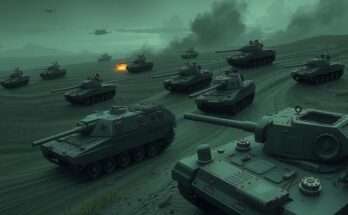Khalifa Haftar freed Nigerien opposition leader Mahamadou Saleh after pressure from Emmanuel Macron. Influenced by Tuareg leader Rissa Ag Boula, Saleh’s release may alter Niger’s power dynamics, potentially supporting opposition forces. His detention occurred amid clashes in Qatrun, raising stability concerns in the region.
Khalifa Haftar has released Mahamadou Saleh, a Nigerien opposition leader, following diplomatic pressure from French President Emmanuel Macron. Saleh’s release came mere days after his detention in southern Libya and was reportedly influenced by Rissa Ag Boula, a notable Tuareg leader with significant influence in the Sahel region.
Saleh, who previously commanded an armed faction in Libya’s Qatrun region for two years, is thought to have critical intelligence on opposition movements against Niger’s military junta, which has ties to Russia. Reports indicate that Macron specifically urged Haftar during their February 26 meeting in Paris to avoid extraditing Saleh back to Niger’s ruling military council, which has faced significant international condemnation since the July 2023 coup.
The Italian news agency Nova has indicated that Saleh’s release could potentially alter the balance of power in the region, possibly bolstering Niger’s opposition and further destabilizing the military leadership in Niamey, which is already under considerable global scrutiny. Saleh’s detention coincided with violent clashes in Qatrun involving forces loyal to Haftar’s son, Saddam Haftar, and those aligned with Hassan Al-Zadama, leading to unrest and disruptions in vital trade routes between Libya, Niger, and Chad.
The release of Mahamadou Saleh signifies a crucial development in the regional power dynamics involving Niger’s opposition and its military government. Influenced by international diplomatic efforts, particularly from France, this event may enhance opposition actions and exacerbate tensions faced by the junta. In addition, ongoing clashes in Qatrun indicate escalating conflicts that further complicate the situation in the Sahel region.
Original Source: libyaobserver.ly




